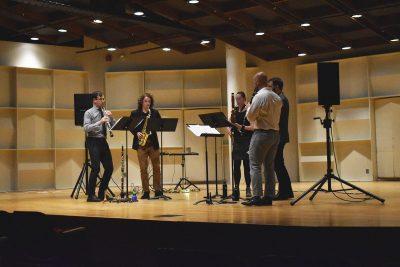
Since January, woodwind and brass student performers were excluded from in-person rehearsals and instead practiced remotely, but Boston University has now reversed that decision — all instrumentalists are now allowed to play in person.
After student petitions and efforts from College of Fine Arts Dean Harvey Young, the BU Medical Advisory Group and Community Health Oversight Group reevaluated the situation.
Wind and brass students are now “allowed to resume with adherence to enhanced measures to further reduce risk of transmission,” according to an email sent to students by CFA School of Music Director Gregory Melchor-Barz.
The email outlined safety recommendations for students that include mask wearing, bell covers that have filtration material or triple-ply masks and social distancing in accordance with state guidelines — 10 feet between musicians and 25 feet away from the audience.
Melchor-Barz wrote that the school suggests maintaining 12 feet between players if possible.
Rehearsals should abide by a 30-minute limit, and rooms used for rehearsals must be cleared and disinfected. Prior to the next rehearsal, the room must receive a minimum of one HVAC air change, according to Melchor-Barz’s email.
“Outdoor activity remains the best place for air flow,” Melchor-Barz wrote, “and rehearsals should take place in an outdoor setting whenever possible.”
Davidson Hamer, professor of global health and member of BU’s Medical Advisory Group, said the situation was “complicated.” When musicians blow through their instruments, he said, that air may carry virus particles should the player be infected.
“I think we still feel the same way about the need for caution with wind instruments and I would say brass also, just because basically people are blowing hard through them,” Hamer said. “Some of what they blow through gets filtered out, but a lot of it doesn’t.”
Hamer said decreasing COVID-19 cases on campus — despite a recent rise in state cases — as well as an option for outdoor practices made the return to in-person practice feasible.
“The thinking was really encouraging outdoor practice as much as possible,” Hamer said. “So there’d be sort of natural air currents to help with that.”
Though he was not privy to the meetings that took place, Director of University Ensembles Michael Barsano said he believed science drove the decision-making process.
“We’re all very, very aware of the risks,” Barsano said. “Our faculty and staff are going to be extremely vigilant to make sure everyone’s following the guidelines that were set forth by the University, to keep everyone as safe as possible.”
Barsano said faculty would also check green badges of students attending in-person rehearsals.
“I’m very happy that it’s happening,” he said. “It’s been a hard year for our students.”
BU Pep Band manager and CFA senior Victoria Paspalas said student petitions, including one she helped author, advocated for the program after a successful semester of adhering to COVID-19 guidelines and played a role in the decision.
“We had had some pretty strict guidelines in place, both that came down from the Medical Advisory Group and then from the College of Fine Arts,” Paspalas said, “but also kind of self-imposed within the program that we felt that we did a fantastic job with adhering to.”
Paspalas said she believed the recent warmer weather — that now allows for outdoor practices — was also a determining factor.
“I think that knowing that we’d be able to be playing outside might have been a big thing for them as well,” she said. “Either way, I’m not looking a gift horse in the mouth, I’ll definitely take whatever I can get. So I’m very, very pleased.”
Billy Sheahan, a trombone player and junior in CFA, said he gained a lot of valuable experience from learning how to perform remotely. Sheahan cited some hesitancy about the decision to allow woodwind and brass players to rehearse in person.
“I was concerned that there would be people within the ensemble,” he said, “who would not be taking restrictions as seriously as I have been.”
Sheahan said he is aware that his opinion is not the majority, but he believes reinstating in-person performances may not be safe.
“I frankly don’t want to be playing in a room with other people right now,” Sheahan said. “I’ve played outside with plenty of space between us, and I felt safe doing that. But ultimately, I had no intention of congregating in a room and playing a wind instrument.”
Jackie Bartling-John, a graduating master’s student in CFA studying flute, said she was very happy to hear that woodwind and brass players would be able to attend in-person rehearsals again.
“I know that I was very overjoyed,” she said. “I was not alone in that, because, you know, it’s just something we’ve all really missed.”
Bartling-John said she had missed the sense of community that comes with in-person rehearsals.
“I’m personally very grateful to the admin for listening to the students,” she said.























































































































Jennifer • Mar 24, 2021 at 12:53 pm
This is wonderful news! Quite frankly, BU CFA has been behind in creating safe spaces for performance. Eastman School of Music (example of a well known conservatory within a University) prioritized conditions for ALL performance majors and has provided mutliple opportunities nfornin person ensemble performances throughout the year. It is extremely disappointing that the CFA did not figure this out early on, especially with the large size of the BU campus and multiple facilities. Our current Vocal Performance Majors are not given these invaluable opportunities for live, in person applied ensemble instruction. It would be interesting to see an investigation into why this could not happen, at all, with such a large campus compared to smaller conservatories around New England and beyond.